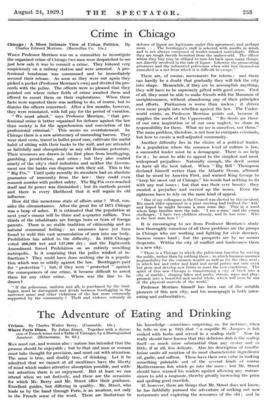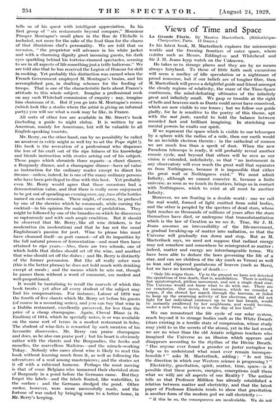The Adventure of Eating and Drinking
Viviana. By Charles Walter Berry. (Constable. 10s.) Where Paris Dines. By Julian Street. Together with a discus- sion of French wines and a Table of Vintages, by a Distinguished Amateur. (Heinemann. 8s. 6d.) MAN must eat, and woman also : nature has intended that the process should be enjoyable ; but to that end man or woman must take thought for provision, and must eat with attention. The same is true, and doubly true, of drinking. Let it be admitted that we cannot at all mealtimes have the liberty of mind which makes attentive absorption possible, and with- out attention there is no enjoyment. But at least we can attend when we eat festively, and these are the occasions for which Mr. Berry and Mr. Street offer their guidance. Excellent guides, but differing in quality. Mr. Street, who leads us by the hand through Paris, is an amateur, not only in the French sense of the word. There are limitations to his knowledge—sometimes surprising, as, for instance, when he tells us (on p. 192) that "a coquille St. Jacques is fish cooked with herbs and served in a scallop shell." Now he really should have known that this delicious dish is the scallop itself—so much more substantial than any oyster and so little, if at all, less delicate. Also his description of bouilla- baisse omits all mention of its most characteristic ingredients oil, garlic, and saffron. These have their own value in making something palatable out of the several kinds of coarse Mediterranean fish which go into the mess ; but Mr. Street should have warned his readers against allowing any restaur- cdeurs to add a langouste, thereby greatly increasing the price and spoiling good crawfish.
If, however, there are things that Mr. Street does not know, he has faithfully pursued the adventure of seeking out new restaurants and exploring the resources of the old ; and he tells us of his quest with intelligent appreciation. In. his first group of "six restaurants beyond compare," Monsieur Prosper Montagne's small place in the Rue de l'Echelle is included, not more for the sake of the food than for the charm of that illustrious chef's personality. We are told that on occasion, "the proprietor will advance in his white jacket and with a charming dignity greet incoming guests, his dark eyes sparkling behind his tortoise-rimmed spectacles, seeming to see in all aspects of life something just a trifle ludicrous." We are told also that he has received the Legion of Honour for skill in cooking. Yet probably this distinction was earned when the French Government employed M. Montagne's brains, and his accomplished pen, in drafting schemes for the feeding of troops. That is one of the characteristic facts about France's attitude to this whole subject. Imagine a professional cook on any such Whitehall commission of enquiry : nay, imagine him chairman of it. But if you go into M. Montagne's rooms (which look like a studio where the artist is giving an informal party) you will see what a cook may be like, in France.
All sorts of other lore are available in Mr. Street's book (including a guide to night clubs). It is written by an American, mainly for Americans, but will be valuable to all English-speaking tourists.
Mr. Berry, on the other hand, can by no possibility be called an amateur (a critic might as well try to set the Pope right !). His book is the recreation of a professional who dispenses the lore of his craft out of the ripe fulness of his knowledge and blends instruction with stories arising out of his subject. Those pages which chronicle three repasts—a claret dinner, a Burgundy dinner, and a champagne dinner—have nd value as instruction for the ordinary reader except to direct his dreams—unless, indeed, he is one of the many ordinary persons who have been privileged to dine with this host. Yet probably even Mr. Berry would agree that these occasions had a demonstration value, and that there is really more enjoyment to be got out of spending an evening over, say, two of the bottles named on each occasion. These might, of course, be prefaced by one of the sherries which he commends, while cursing the cocktail—in his opinion the main cause of prohibition. They might be followed by one of the brandies on which he discourses so rapturously and with such ample erudition. But it should be observed that Mr. Berry, like all wise drinkers, is for moderation (in moderation) and that he has not the usual Englishman's passion for port. Wine to please him must have cleansed itself—as port cannot—of all its impurities by the full natural process of fermentation—and must then have attained to ripe years.—Also, there are two schools, one of which holds that dishes should set off the wine, and another that wine should set off the dishes ; and Mr. Berry is distinctly of the former persuasion. But like all really sober men (this is the better phrase) he does not hold much with drinking except at meals ; and the menus which he sets out, though he passes them without a word of comment, are modest and well-proportioned.
It would be tantalising to recall the marvels of which this book treats ; yet after all every student of the subject may find his compensations. For instance, Latour of 1870 was the fourth of five clarets which Mr. Berry set before his guests (of course in a mounting series), and you can buy that wine in a Dublin restaurant, excellently preserved, for less than the price of a cheap champagne. Again, Cheval Blanc (a St. Emilion) of 1914, which he specially notes, is or was available on the same sort of terms in a modest restaurant in Soho. The student of wine-lists is rewarded by such mention of his favourite discoveries. Mr. Berry can praise champagne and does, as he also can praise port ; but his heart is obviously rather with the clarets and the Burgundies, the hocks and moselles, the marvellous Madeiras—and the miracle-working Tokay. Nobody who cares about wine is likely to read this book without learning much from it, as well as following the adventures of a soul among masterpieces ; and the stories set it off with a rubicund humour. Perhaps the most moving is that of some Belgians who immersed their cherished store of Burgundy in a pond before the Germans came. But they forgot the labels--and the labels floated, like waterlilies, to the surface : and the Germans dredged the pond. Other caches, however, were more successfully made, and the fortune of war ended by bringing some to a, better home, Iii
Mr. Berry's keeping. . _































 Previous page
Previous page